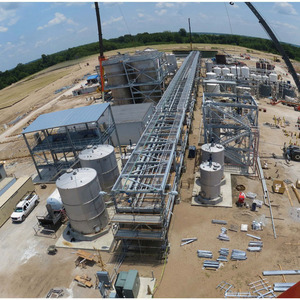Myriant withdraws $125 million IPO




Myriant Corp.
January 14, 2014
BY Erin Krueger
More than a year and a half after it filed a registration statement with the U.S. Securities and Exchange Commission, Myriant Corp. has announced it does not intend to pursue a public offering at this time. On Jan. 8, the company filed a request with the SEC asking for the withdrawal of its registration statement. Myriant originally announced its plans to proceed with an initial public offering (IPO) in May 2011.
While a representative of the company did not respond to requests for additional information on the withdrawal, Myriant said in the SEC filing that the company “believes the withdrawal to be consistent with the public interest and the protection of investors.” The company had listed a proposed maximum aggregate offering of $125 million in its May 2011 registration statement.
Myriant announced the startup of its flagship biobased succinic acid plant in Lake Providence, La., on June 17, 2013. The facility, which has the capacity to produce 30 million pounds of biobased succinic acid per year, was partially funded through a $50 million cost sharing cooperative agreement received from the U.S. DOE, $25 million from the USDA Business and Industry Loan Guarantee Program and a $10 million grant from the Lake Providence Port Commission and the Louisiana Department of Transportation.
Advertisement
The company also has partnership relationships with a variety of industrial partners in the chemical, process technology and engineering industries. Myriant announced an alliance with Uhde Corp. of America and its technology provider Uhde GmbH in November 2009 for the engineering, procurement and construction (TPC) of its biobased succinic acid plants.
In January 2011, Myriant announced the closing of a $60 million strategic equity investment from Thailand-based PTT Chemical Group. At that time, the company said it would use the investment for ongoing development of its biobased chemicals technology and to help fund the commercialization of its succinic acid platform, including construction of the Lake Providence plant.
Advertisement
In November 2011, Myriant announced a sales and marketing partnership with Japan-based Sojitz Corp. Under the partnership, the companies agreed to collaborate in the sales and marketing of biobasd succinic acid in Japan, China, South Korea and Taiwan. Myriant formed a separate agreement in March 2013 with Turkey-based Bayegan Group. Under that broad collaboration agreement, the companies agreed to commercialize biobased succinic acid in markets across the Middle East, Eastern Europe and Africa.
Myriant has also partnered with Davy Process Technology. The two companies signed a memorandum of understanding (MOU) in February 2011 to use succinic acid as a biobased feedstock for the production of butanediol, tetrahydrofuran and gamma-butyrolactone. The MOU included an exclusive joint development agreement to integrate Myriant’s biobased succinic acid technology with Davy’s butanediol technology to minimize the cost of recovery and purification of the succinic acid for the production of biobased butanediol.
Related Stories
The U.S. Department of Energy Bioenergy Technologies Office (BETO) announced up to $23 million in funding to support research and development (R&D) of domestic chemicals and fuels from biomass and waste resources.
The U.S. DOE has announced its intent to issue funding to support high-impact research and development (R&D) projects in two priority areas: sustainable propane and renewable chemicals and algal system cultivation and preprocessing.
Sens. Sherrod Brown, D-Ohio, and Pete Ricketts, R-Neb., in August introduced the Renewable Chemicals Act, a bill that aims to create a tax credit to support the production of biobased chemicals.
The Chemical Catalysis for Bioenergy Consortium, a consortium of the U.S. DOE’s Bioenergy Technologies Office, has launched an effort that aims to gather community input on the development of new biomass processing facilities.
USDA on March 8 celebrated the second annual National Biobased Products Day, a celebration to raise public awareness of biobased products, their benefits and their contributions to the U.S. economy and rural communities.
Upcoming Events










